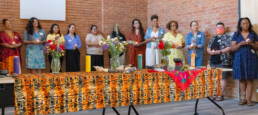TLC was founded by and for BIPOC leaders in Colorado to see our visions of liberation come to life. Welcome to our seasonal publication, TRANSPiRE!
Cohort 5 Welcome Ceremony – Photo by URBN Brands
Beloveds,
It has been just six months since the new administration came into power, and our worst nightmares around the cruelty and devastation it would unleash on our communities are coming true. There is no sugar coating this reality, but as we have been moving through our denial, grief and rage, it feels like something has started to shift. From the streets of Los Angeles to the polls in New York City, we see glimmers of hope, resistance and radical solidarity.
A core part of TLC’s founding vision was to nurture solidarity within and across BIPOC communities. Since that time, we have experienced a highly organized propaganda campaign to divide our communities. Social media algorithms will have us believing that we have all sold each other out, that we don’t care about each other’s struggles, that the traumas and internalized oppression held by our different identities can be easily manipulated and weaponized against each other. As a movement dedicated to the liberation of all humans and life on earth, we must challenge these narratives with everything we have. If we do not find generative and transformative ways to address the tensions that do exist within and between our communities, they will continue to be exploited to benefit the emerging “multiracial right wing” that is fracturing decades of progressive political organizing and movement building.
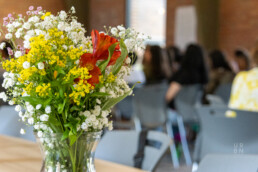
Social media algorithms will have us believing that we have all sold each other out, that we don’t care about each other’s struggles, that the traumas and internalized oppression held by our different identities can be easily manipulated and weaponized against each other.
This is why TLC is doubling down on our work to transform conflict, support a deeper understanding of each other’s struggles and cultivate solidarity. In this newsletter, you will find a beautiful interview of two TLC Fellows who are bringing conflict healing tools to local housing justice organizing, a recap of our joint training on Anti-Semitism and Islamophobia which kicked off our “Solidarity Series,” and an update about Another World is Possible, a solidarity based mutual aid fund for our frontline leaders and organizations.
As institutions continue to crumble, we know that it is primarily the strength of our collective relationships that will get us through these times. As Grace Lee Boggs said, “We never know how our small activities will affect others through the invisible fabric of our connectedness. In this exquisitely connected world, it’s never a question of ‘critical mass.’ It’s always about critical connections.”
In this spirit, we invite you to make this a summer of solidarity: lean in, show up, and reach out – deep within the communities you identify with AND across to the communities you don’t. Every small action we take, to defend and protect each other, to collectively resist and take action, to heal conflict and restore right relationship, to share joy and nurture our dreams together, will turn these emerging glimmers of hope into an unstoppable force.
With gratitude and deep solidarity,
TLC Team
Updates this Summer
News from the TLC Pathway
Welcoming Cohort 5
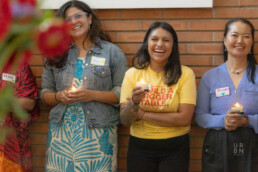
Cohort 5 Welcome Ceremony – Photo by URBN Brands
We are thrilled to welcome the newest class of the TLC Fellowship! Our fifth cohort includes 22 BIPOC Executive Directors leading beautiful, challenging, and critical justice work in communities across our state. It is an honor to start the TLC journey with these fellows who have the courage and willingness to lead in these incredibly challenging times. Please check them out and learn a little bit about who they are here – and if you know them, please reach out with your support and congratulations!
Graduate Spotlight: Dre and Celesté
We caught up with Dre Chiriboga-Flor, Executive Director and Co-Founder of Justice for the People, former State Director of 9to5 Colorado and 2021-2022 (Cohort 3) TLC Graduate as well as Celesté Martinez, Owner of Celestial Alegría, LLC and 2018-2019 (Cohort 2) TLC Graduate, to get a glimpse of where TLC has taken them!
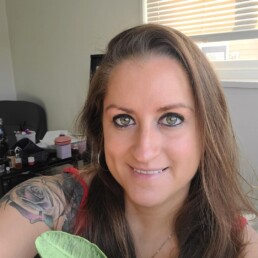
Image courtesy of Dre Chiriboga-Flor
Q: Can you share a little bit of the story of how the Montevista resident-owned mobile home park came to be?
Dre: Montevista is the last mobile home park in Westwood, a Spanish-speaking and working-class neighborhood in southwest Denver. This was the last park standing after the residents of two other local parks were forcibly displaced over ten years ago. When Montevista went up for sale in 2022, the owner expressed openness to selling it to the residents, despite having an outside buyer lined up. Residents immediately reached out to 9to5 Colorado, where I was working at the time, given the organization’s reputation around organizing in mobile home communities. With the support of Montevista residents who door-knocked and recruited their neighbors, I helped to form an official Resident Board.
With the Resident Board in place, we took advantage of the State Opportunity Purchase Law (which 9to5 helped win in 2020 and later improved in 2022), which gives residents at least 120 days to make an offer and secure at least 51% of residents’ buy-in towards a purchase option. Within a matter of months, we launched a community-owned real estate project and a capital campaign.
We knew we had to raise at least $11.5 million to make a competitive offer. After some investing leads fell through, our big break came through the City of Denver, who made the first soft commitment of $2.6M towards the acquisition fund, got the state to match their contribution, and provided leverage for us to raise the additional $6.5 million. Residents were a part of every meeting with funders, investors and other stakeholders throughout the journey, and they are now poised to assume full ownership of their park.
With 76 families living in the park, however, conflict just naturally comes up. To protect this incredible win, support collective governance and sustain the resident leaders, we decided to establish a Conflict Resolution Committee. I knew I needed outside support for this effort and reached out to my TLC Network for guidance. Soon, a collaboration between local practitioner and TLC facilitator, Naomi Ochoa, and local consultant and TLC graduate, Celesté Martinez, emerged. They teamed up to form a beautiful, synergistic partnership. With Naomi and Celesté as co-facilitators, the committee, made up of mostly women of color, helped to create spaces of healing. Spaces where people can express their discontent in healthy and generative ways – a move away from a culture of divisiveness and throwing-people-away, which is the default of our times.
Celesté: We launched the Conflict Resolution work in November 2024 and completed the first phase this April. Naomi Ochoa, a deeply experienced circle keeper and conflict practitioner, brought her skills, in combination with my bilingual community organizing training background. By blending both of our strengths, we delved into various topics with committee members. We discussed how circle keeping is an ancestral practice in many indigenous cultures, and could support the MonteVista community in navigating conflict. Before creating circles to work towards compromise and shared values, we unpacked the concept of power, especially the differences between the dominant power that we are steeped in and the collective power that we are trying to build. We spent a significant amount of time understanding the nervous system, cultivating awareness of activation points, how we respond from dysregulation, how our nervous systems also connect with trauma responses, and ways to support ourselves and others to return to a state of equilibrium.
Most of the curricula was designed to encourage the six committee members to reflect on their own lives and how these skills could be applied to their family and close relationships. Knowing that conflict can stem from experiencing scarcity in real life and not having our fundamental needs met, we encouraged participants to identify how to resource themselves and the community. Additionally, we explored the four major types of conflict, which is something I learned during my TLC fellowship and continue to reference in my coaching and consulting with clients. In the end, committee members were encouraged to adopt somatic practices and a set of collective agreements informed by collective values, and began developing action plans for how they would work together as a team to steward emerging conflicts in MonteVista from beginning to end with a custom tailored protocol. Similar to TLC’s culture, we encouraged committee members to lean on their faith, spiritual practices and rituals to guide their ongoing work.
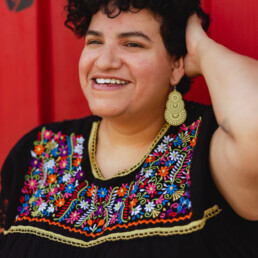
Image courtesy of Celesté Martinez
Q: Tell us more about the collective resident leadership model:
Dre: The organizing model at my organization, Justice for the People, includes setting up a Resident Board as the most fundamental step. Creating this decision-making body sets the tone for how efforts unfold, authentically led by the community and not an outside organizer like me. Because it can be very harmful for organizers who don’t live in the community to make decisions, we must foster a sense of autonomy. We instill in community members the belief that their power creates change, and we limit outside intervention to guidance, training, and resource sharing. Establishing a democratic governance structure that is rooted in healthy values and that provides everyone opportunities to voice their opinions and vote on different decisions is paramount.
“We have to be ready and anticipate the flux of life by preparing many people who can fulfill prominent roles. The more leaderful the community, the healthier and better equipped it will be to support transitions.”
~ Dre Chiriboga-Flor
In community, the process of leadership development is ongoing. Board members might move in and out of roles based on their life circumstances – health challenges or a job loss, for example. We have to be ready and anticipate the flux of life by preparing many people who can fulfill prominent roles. The more leaderful the community is, the healthier and better equipped it will be to support transitions. Developing a Conflict Resolution Committee aligns with this thinking, to help prepare other residents who could step into various leadership roles that will be required once they become full owners of the park.
With a board composition of mostly men, we were intentional about recruiting women for the Conflict Resolution Committee as a way to balance power positions within the Montevista community. This has also translated to their negotiation of power with outside entities, such as the interim owner and management company. In the end, no big decision is made without residents’ input and both clear and transparent communication connects everyone involved.
Throughout the three years of monthly board meetings and active governance, it has been powerful to see the growth. Residents have shared their stories with the press, some speaking to media outlets for the first time. People also testified before their city council members for the first time and developed strong relationships with their representatives. Three residents and two of their children traveled with us to a conference in New Orleans and, despite some nerves, spoke before an audience of 500 people from around the country to share the Montevista story. Moments where people take their leadership to the next level are transformational.
Q: How did TLC inspire you to invest in training these leaders around conflict? Why is this so important?
Dre: One of the most powerful memories I have is from a TLC Fellowship retreat, where two leaders courageously addressed their tension by doing a conflict resolution circle in front of everyone. We are usually taught that conflict is something you go into defensively, thinking the outcome is to be right and that there will be a winner and a loser. Yet witnessing the powerful moment between my peers in front of our whole cohort was transformative. It solidified the importance of approaching conflict from a place of understanding, where we truly hear where everyone is coming from. This experience taught me that conflict transformation is nuanced.
Unresolved conflict can be disruptive and its damage irreversible. The Montevista community is not immune. I have heard of this happening at other parks where their resident-owned projects fell into receivership, which means their parks will likely be sold off to a corporate landlord. That is why educating residents, partners, and funders about fostering a culture of transforming conflict in healthy ways is as important as the capital project itself. The Montevista residents are not only committing to buying together, but to living together, potentially for the rest of their lives. There is a lot at stake. If we don’t establish governance structures and practices that sustain this community for the long haul, all that has been achieved so far could be lost.
Celesté: During my experience at the TLC Fellowship, it was integral for me to see other women of color and queer folx of color as full-time facilitators and coaches, and it offered me inspiration to pursue a similar path. TLC helped plant the seed to launch my consulting business. Consulting often gives me the vantage point of viewing things from a 30,000 foot view of our Colorado ecosystem, and I see a major capacity gap around conflict transformation, and especially for those who support Spanish speaking and bilingual communities. Our movement spaces need to grow more comfortable with moving through conflict to heal and deepen connection, and they need more practitioners to offer this type of support. The reality is that people are really hungry for these opportunities. As I stay engaged with TLC and connect with fellows over the years, I continue to hear that moving through conflict resolution has been truly impactful and transformative for people.
In the work with Monte Vista residents, Naomi and I were able to explain the historical context behind our frequent desire to win in conflict stems from the roots of both colonization and conquest. This inheritance often unfolds in our interpersonal interactions and communal dynamics, and we are often unconscious to these dynamics. This is why tending to the many aspects of communities and culture must include stewarding conflict and learning the art of compromise, so people can come into alignment and right relationship with one another.
Seeing participants personal growth from their experience in this committee and their desire to share learnings with the greater community was transformative. In one example, two leaders experienced a moment of conflict during the training and Naomi and I were able to move through it by applying approaches we were teaching. Instead of reenacting a victim-perpetrator binary, the leaders involved took the time to reflect on their own contributions to the tension and committed to compassionately reconnecting and continuing their working together. People’s willingness to self-reflect was evident and powerful to witness.
Q: What is the connection between conflict transformation work and solidarity?
Celesté: Addressing the culture of competition is part of solidarity building, and I see this as an antidote to address divisions. “Oppression Olympics” insists on identifying whose suffering is the greatest, which fuels interpersonal and communal conflicts. We tend to compete for the same resources in the nonprofit sector, especially in these times, as foundations further hoard resources or shy away from investing in innovative community strategies. In this way, our communities are intentionally pitted against one another, so we must find opportunities for collaboration and knit together points of intersection.
As people with oppressed identities who experience direct violence – because of the melanin of our skin, our immigration status, our gender, sexuality, ability, and so much more – we are often reacting out of self-preservation. A lot of times, we respond from an activated nervous system response or from a trauma response, and we don’t often have the opportunity to come back to equilibrium within our bodies. One of the most important pieces of our work with the Montevist committee was cultivating spaces for nervous system regulation, because this is a major root cause of the unaddressed or unresolved conflicts that disrupt our potential for connection.
“As people with oppressed identities who experience direct violence – because of the melanin of our skin, our immigration status, our gender, sexuality, ability, and so much more – we are often reacting out of self-preservation. A lot of times, we respond from an activated nervous system response or from a trauma response, and we don’t often have the opportunity to come back to equilibrium within our bodies.”
~ Celesté Martinez
Dre: Justice for the People is a law firm that thrives in winning cases. While it’s true that we intend to win when we go to court, we also recognize that these fights occur within a colonial justice system that doesn’t work for our communities, that upholds laws that don’t work for us. We recognize that lawsuits are not a silver bullet; they are a tool in the toolbox that has largely been inaccessible to our communities, which we are slowly but surely trying to change. As leaders, we can’t solely depend on these strategies and systems to “save us”; we need to continue to organize and create practices for our movement spaces and for our people, like the Montevista residents, who are trying to live and thrive together. There are so many outside forces that want this resident-owned project to fail, that want to buy up this property and both exploit and displace people. When tensions come up in interpersonal connections, we need to remember that we are not each other’s enemies. If we don’t have that foundation, we are not going to be able to care for and protect each other. Our job is to create spaces to heal and resist duplicating punitive practices that ultimately disrupt the fabric of our communities. There are other solutions!
Who We Are Matters
Updates from the TLC Network

Another World is Possible
Another World is Possible
Last year, TLC began to get calls about organizations losing funding because they made statements or shared social media posts expressing support for Palestinian human rights and liberation. At the same time, many of our immigrant/refugee-serving and BIPOC-led nonprofits were busy planning for the attacks that began when the new federal administration took over. We knew we needed to reopen the Another World is Possible Fund with our partners at the Chinook Fund to meet the urgent needs that were upon us.
We send deep gratitude to our funders (The Colorado Health Foundation, The Robert Wood Johnson Foundation, the Kataly Foundation and Margery Goldman), donors, and friends, who helped us raise over $185,000 to fund 37 organizations for activities such as: know your rights trainings, digital security, community safety planning, expanding food security programs, narrative/culture shifts and healing, wellness and trauma-informed support.
But we are not done – we have a goal to raise a total of $1,000,000 in the next two years to continue supporting rapid-response requests (from bail funds to safe meeting spaces) and providing mutual aid to our network. We invite you to consider donating and sharing with others to ensure we have the resources to support this beautiful network in this critical moment. It is our steadfast solidarity and commitment to our visions that will get us to the other side of these challenges to create something even better for the generations to come. Click here to donate today.
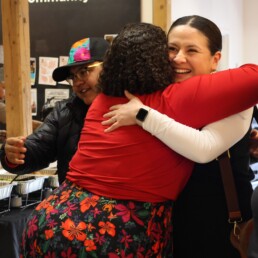
TLC 2025 Fam Reunion
#HugFest with TLC FAM
TLC hosted a joyous Fam Reunion on the Spring Equinox, and wow, our hearts are still full. Four fellowship cohorts gathered, and the joy was as palpable as the deep-rooted solidarity in the room. There were so many hugs. SO. MANY. HUGS. Our fellows represent a beautifully diverse range of identities and experiences, but our common goal is clear: a shared commitment to uplifting and transforming BIPOC leadership. TLC alum, Alejandro Flores Muñoz of Combi Cafe catered the event, and both MyKing Ice Cream and Smith+Cannon sweetened the afternoon with their ice cream desserts. From creating stunning mini bouquets to blowing bubbles as breathwork, we created a much needed space of laughter, joy and belonging as an act of resistance and resilience during this dark chapter of political repression. We came weary but left renewed – grounded, nourished and reminded of the power of coming home to each other.

What it Takes to Heal: How Transforming Ourselves Can Change The World
What It Takes to Heal
In partnership with CIWO (Center for Innovation in Worker Organization at Rutgers University), we hosted Prentis Hemphill, renowned healing justice activist and author of the national bestseller, “What it Takes to Heal: How Transforming Ourselves Can Change The World.” On May 9th, over 135 of participants joined the virtual gathering and accessed the wisdom of one of the most prominent voices in the conversation around healing justice. Together, we delved into offerings from the book, which offers us new perspectives and directions on how to heal on both personal and collective levels.
TLC highly recommends this book for this moment – you can order a single or bulk copies for your team at Porchlight Books.
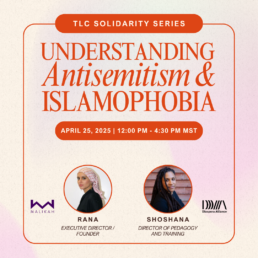
Understanding Antisemitism & Islamophobia
TLC Solidarity Series
On April 25th, we kicked off TLC’s Solidarity Series with “Understanding Antisemitism & Islamophobia,” in partnership with Diaspora Alliance and Malikah. TLC’s goal for this series is to deepen our solidarity by learning more about each other’s history and understanding both the unique and connected experiences our communities face. We organized this first session to help ground us as we navigate the current climate of political repression where the current administration, philanthropy, universities and other institutions are weaponizing the very real oppression of anti-semitism and using it as a cover to target free speech, progressive activism, the defense of human rights and as a justification to detain and deport immigrants. Facilitators, activists and community organizers Rana Abelhamid and Shoshona Brown powered up our analysis and invited us to think critically about false binaries, misleading and untold histories, and who benefits from the status quo.
In the next few months, we will be taking some deep dives into pro-im/migration, pro-blackness, pro-indigeneity and other conversations to continue deepening our solidarity with each other.
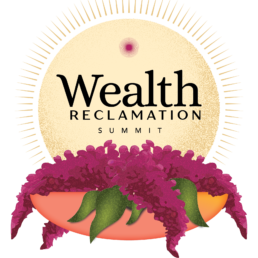
2025 Wealth Reclamation Summit
Sponsor the 2025 Wealth Reclamation Summit
This November we are hosting our 3rd Annual Wealth Reclamation Summit, an event that brings together BIPOC nonprofit and community leaders who are in the process of reclaiming wealth by buying and/or renovating buildings, acquiring and stewarding land, and undertaking other innovative capital projects. Our presenting sponsor, The Colorado Health Foundation, has provided key support to bring this event to our communities each year and we are expanding our base of support. With a growing participation of 150+ leaders from Colorado organizations, we encourage field professionals and businesses to explore this year’s Sponsorship Opportunities to further your brand and connect with leaders who are seeking firms and consultants who deliver values-driven expertise on real estate, construction, architectural design, legal counsel, ownership models, property management, finance, capital campaigns, proforma, crowdfunding, investing and more. We are also looking for session hosts. If you have an idea, please contact Felicia Griffin.
What We Are Pondering
Our team is in reflection mode and distilling gems from various articles, books, podcasts, and more. We humbly offer some of the thought provoking pieces that are captivating our minds, hearts and spirits.
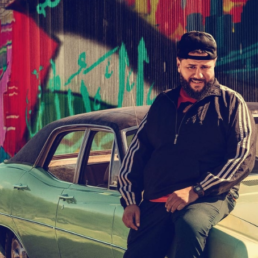
Mo (TV series)
Mo follows a Palestinian refugee descendant living in Houston, Texas, who is currently seeking asylum and citizenship in the United States. The comedy-drama series brings to the screen a Palestinian refugee, Mo, who hustles to support his family in Texas while navigating a pending asylum request, and exploring the parallels of two cultures, and three languages.
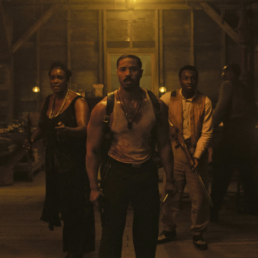
Sinners (Film)
This 2025 supernatural horror film is set in 1932 Mississippi, where identical twins and World War I veterans return to their hometown to start again, where they are confronted by a supernatural evil. The film offers an ecstatic exploration of the evolution of blues and the connection between the progression of music from pre-slavery to post-slavery.
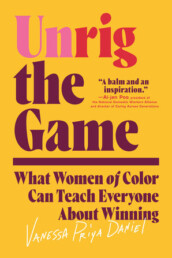
Unrig the Game
by Vanessa Daniels
A much-needed playbook to supporting and retaining women of color in leadership roles to create lasting change in the world, from a former labor and community organizer and founder of one of the nation’s premier funders of women of color-led organizations. The author, Vanessa Priya Daniel, has worked in social justice movements for twenty-five years as a labor and community organizer and funder. She founded and served for seventeen years as executive director of Groundswell Fund, a leading funder of women of color-led grassroots and electoral organizing.
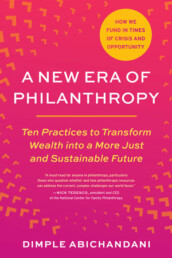
A New Era of Philanthropy
by Dimple Abichandani
Can philanthropy be an anti-racist, feminist, relational, and joyful expression of solidarity? This book argues that it not only can be—for the future we seek, and for philanthropy to achieve its greatest impact, it must be. Nationally recognized philanthropic leader Dimple Abichandani revolutionizes the precepts of modern philanthropy. Offering 10 provocative practice shifts, A New Era of Philanthropy engages readers with fresh answers to the question of how philanthropy can meet this high-stakes moment—from reimagining governance to aligning investments to crisis funding and beyond.
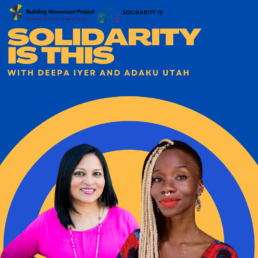
Solidarity Is This (Podcast)
On this episode of the Solidarity Is This podcast, guest speaker Dom Kelly – a lifelong disability advocate, a proud triplet with cerebral palsy, and a nationally recognized leader working at the intersections of disability justice, racial equity, and southern organizing – speaks on reimagining what’s possible when disabled wisdom leads the way.
Until Next Time
Thank you for receiving this seasonal offering. We look forward to returning to your Inbox before the end of the year with more news, announcements, and wisdom.

